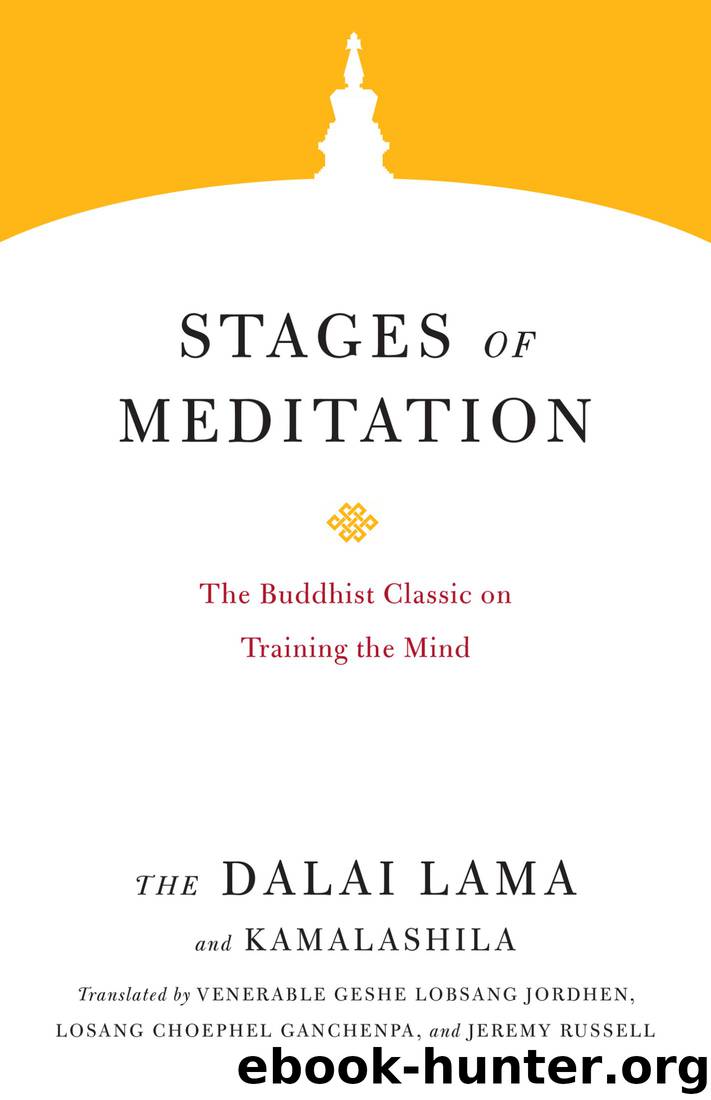Stages of Meditation by Geshe Lobsang Jordhen & Losang Choephel Ganchenpa & Jeremy Russell & The Dalai Lama & Kamalashila

Author:Geshe Lobsang Jordhen & Losang Choephel Ganchenpa & Jeremy Russell & The Dalai Lama & Kamalashila
Language: eng
Format: epub
Publisher: Shambhala
Published: 2019-02-19T00:00:00+00:00
7. COMMON PREREQUISITES FOR MEDITATING ON CALM ABIDING AND SPECIAL INSIGHT
HOW SHOULD CALM abiding meditation and special insight be practiced together?
Initially the yogi should seek the prerequisites that can assist him in actualizing calm abiding meditation and special insight quickly and easily.
It is clear that practitioners need to rely on these prerequisites in order to gain spiritual realizations.
The prerequisites necessary for the development of calm abiding meditation are: to live in a conducive environment, to limit your desires and practice contentment, not being involved in too many activities, maintaining pure moral ethics, and fully eliminating attachment and all other kinds of conceptual thoughts.
Kamalashila next explains what a conducive, or favorable, environment means.
A conducive environment should be known by these five characteristics: providing easy access to food and clothes, being free of evil beings and enemies, being free from disease, containing good friends who maintain moral ethics and who share similar views, and being visited by few people in the daytime and with little noise at night.
Limiting your desires refers to not being excessively attached to many or good clothes, such as religious robes, and so forth. The practice of contentment means always being satisfied with any little thing, like inferior religious robes, and so forth. Not being involved in many activities refers to giving up ordinary activities like business, avoiding too close association with householders and monks, and totally abandoning the practice of medicine and astrology.
Association in this context refers to gathering and gossiping on and on without any purpose. For those who are able to meditate with much concentration, the practices of medicine and astrology become impediments. Therefore, unless there are special reasons to do otherwise, practitioners are instructed to avoid these worldly pursuits.
Even in the case of the statement that a transgression of the Hearers’ vows cannot be restored, if there is regret and an awareness of the intention not to repeat it, and an awareness of the lack of a true identity of the mind that performed the action, or familiarity with the lack of a true identity of all phenomena, that person’s morality can be said to be pure. This should be understood from the Sutra on the Elimination of Ajatashatru’s Regret. You should overcome your regret and make special effort in meditation.
The two types of moral ethics refer to the vows of individual liberation and the Bodhisattva’s vow. It could also mean the vows of ordained people and the vows of lay people.
The following passage deals with the futility of desire and the need to distance yourself from mundane activities. To this end it is important to discard all types of misconceptions.
Being mindful of the various defects of attachment in this life and future lives helps eliminate misconceptions in this regard. Some common features of both beautiful and ugly things in the cycle of existence are that they are all unstable and subject to disintegration. It is beyond doubt that you will be separated from all of these things without delay. So, meditate on why you should be so excessively attached to these things and then discard all misconceptions.
Download
This site does not store any files on its server. We only index and link to content provided by other sites. Please contact the content providers to delete copyright contents if any and email us, we'll remove relevant links or contents immediately.
| Confucianism | Feng Shui |
| I Ching | Jainism |
| Karma | Shintoism |
| Sikhism | Tao Te Ching |
| Taoism | Tibetan Book of the Dead |
| Zoroastrianism |
The Tao of Physics by Fritjof Capra(2272)
Human Design by Chetan Parkyn(2068)
The Diamond Cutter by Geshe Michael Roach(2059)
Feng Shui by Stephen Skinner(1939)
The Alchemy of Sexual Energy by Mantak Chia(1855)
Tao Te Ching by Lao Tzu(1835)
365 Tao: Daily Meditations by Ming-Dao Deng(1616)
Tao Tantric Arts for Women by Minke de Vos(1592)
Sun Tzu's The Art of War by Giles Lionel Minford John Tzu Sun(1538)
Sidney Sheldon (1982) Master Of The Game by Sidney Sheldon(1514)
Buddhism 101 by Arnie Kozak(1508)
Karma-Yoga and Bhakti-Yoga by Swami Vivekananda(1492)
The Analects of Confucius by Burton Watson(1431)
The Art of War Other Classics of Eastern Philosophy by Sun Tzu Lao-Tzu Confucius Mencius(1425)
The Way of Chuang Tzu by Thomas Merton(1361)
Tao te ching by Lao Tzu(1357)
The New Bohemians Handbook by Justina Blakeney(1352)
The Sayings Of by Confucius(1312)
Bless This House by Donna Henes(1267)
